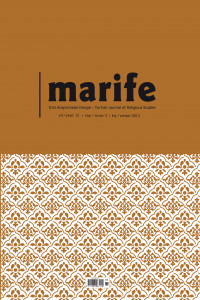Abstract
İslam felsefesinde en önemli yeri tutan Yunan felsefesi tesirinin doğrudan değil, Helenistik felsefe yani İskenderiye yolu ile olduğu bilinir. Miladi altıncı yüzyılın başlarında dağılan Atina okullarının filozoflarından bir kısmı İskenderiye’ye, bir kısmı Suriye’deki merkezlere gitmiş, buralarda Eflatun ve Aristoteles’i açıklayarak Hıristiyanlaşmış Yunan felsefesini oluşturmuşlardı. Bu merkezlerde önce Yunanca yazılan eserler, sonradan Süryanice ve Aramca’ya çevriliyordu. İşte İslam dünyasında tercümesi yapılan ve İslam felsefesine tesir eden eserler de ilk planda bunlardı. Yunan felsefesinin İslam dünyasına aktarılmasında, daha 7. Yüzyılın ortalarında Müslüman Arapların eline geçen Suriye ve İran’daki Hıristiyan Nasturi ve Ya’kubi manastırlarının rolü ayrı bir yer tutar. Bu makalede, Yunan düşüncesinin İslam düşüncesine etkisi, felsefe tanımları noktasında ele alınmış, İslam düşüncesinin Aristocu kanadını temsil eden Meşşâî ekole mensup filozofların felsefe anlayışları, bu anlayışın altında yatan başlıca Yunan filozoflarının görüşleri ışığında bir karşılaştırmaya tabi tutulmuştur
The Conception of Philosophy from the Antiquity to Islamic Thought: An Attempt ofDefinition-Centered Comparison
Abstract
The Greek philosophy that holds the most important position in Islamic is known to influ- ence Islamic philosophy not directly but through the Hellenistic philosophy, i.e., Alexan- dria. Some of the philosophers of the Athens schools that dispersed at the early sixth cen- tury went to Alexandria and some others to the centers in Syria, forming Christianized Greek philosophy by explaining Plato and Aristotle. The works that had been written in Greek in these centers were translated into Assyrian and Aramaic. The works that were translated into Arabic in the Islamic world and influenced Islamic philosophy were mostly these works. In the transmission of the Greek philosophy into the Islamic world, the Chris- tian Nestorian and Jacobean monasteries that went to the hands of the Muslim Arabs as early as the mid seventh century played an important role. In this article, the influence of Greek thought on Islamic thought from the viewpoint of the definitions of philosophy is addressed, comparing the conceptions of philosophy by the philosophers who are affili- ated to the Mashshai School that represents the Aristotelian wing of Islamic thought in the light of the views of the major Greek philosophers who underlie these conceptions
Details
| Primary Language | Turkish |
|---|---|
| Subjects | Religion, Society and Culture Studies |
| Other ID | JA62KF38ZZ |
| Journal Section | Research Article |
| Authors | |
| Publication Date | December 15, 2012 |
| Published in Issue | Year 2012 Volume: 12 Issue: 3 |
This work is licensed under a Creative Commons Attribution-NonCommercial 4.0 International License.

